Current Graduate Students
Graduate students are the life blood of the marine lab, coming from the departments of Biological Science and Earth Ocean and Atmospheric Sciences to work with resident faculty. Their enthusiasm, inquisitiveness, and creativity are contagious to everyone with whom they interact on the laboratory campus, including the staff, each other, and the faculty.
Biological Science
Laura Anthony, Ph.D. Candidate (Advisor Dr. Sandra Brooke)
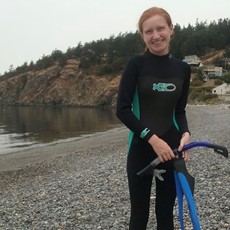 lanthony@bio.fsu.edu
lanthony@bio.fsu.edu
(she/her) I am broadly interested in deep-sea coral ecophysiology. My dissertation research assesses how environmental variables influence the reproduction of reef-building deep-sea corals across the northern hemisphere. I hope to use my work as a way to gauge reef health in the context of climate change and conservation.
Donaven Baughman, Ph.D. Candidate (Advisors Dr. Joel Trexler and Dr. Dan Okamoto)
 dbaughman@bio.fsu.edu
dbaughman@bio.fsu.edu
(he/him) My research focuses on the impacts of predators and environmental factors on the physiological processes and allocation of energy to various important life history characteristics (e.g., growth, predation defense, and reproduction) of eastern oysters (Crassostrea virginica). The goal of my work is to inform the future management of wild oysters and improve aquaculture outcomes by understanding the impacts of biotic (predators) and abiotic (environmental) factors on individual oysters and how these impacts may scale-up to alter population dynamics and oyster harvest outcomes.
Jake Beretta, Ph.D Candidate (Advisor Dr. Dean Grubbs)
 jhb24h@fsu.edu
jhb24h@fsu.edu
I will be focusing my research on coastal elasmobranchs. My work will probably combine acoustic telemetry, physiological biomarkers, and dietary analyses to investigate the movement, health, and ecological role of select species in the Gulf as well as the Atlantic. My projects will also hopefully address critical knowledge gaps identified by federal and state agencies and provide management-ready science to guide conservation and stock assessment efforts for several species.
Ashley Dawdy, Ph.D. student (Advisor Dr. Dean Grubbs)
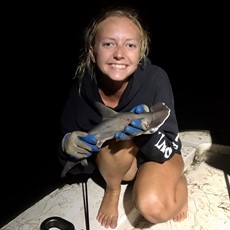 adawdy@fsu.edu
adawdy@fsu.edu
I am primarily interested in elasmobranch movement ecology, particularly for species of conservation concern. My past research used active and passive acoustic telemetry to investigate drivers of movement behavior in coastal sharks. My MS research includes the use of acoustic telemetry to investigate social and mating behavior in the critically endangered smalltooth sawfish (Pristis pectinata) in the Florida Keys, as well as to study the habitat use of Atlantic cownose rays (Rhinoptera bonasus) in Apalachicola Bay, FL. This work contributes to the delineation of essential fish habitat and informs the building of successful species conservation plans.
Adin Nahoa Domen, MSc student (Advisors Dr. Sandra Brooke and Dr. Joel Trexler)
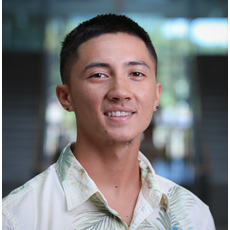 and18h@fsu.edu
and18h@fsu.edu
I am researching the effects of oyster restoration reef height on economically important crustacean species, Callinectes sapidus (Blue Crab) and Menippe mercenaria (Stone Crab) in Apalachicola Bay. I am surveying these introduced and restored habitats for abundance and size of C. sapidus and M. mercenaria to measure the effect of reef height on these species. In order to grasp the effectiveness of implementing these introduced habitats into the bay, we must survey the associated species to truly measure the impact they are having on the community as a whole. Identifying the effect of reef height on these species will give insight into the most effective method of restoring oyster reef habitat in Apalachicola Bay.
Chenoah DuBree, MSc student (Advisors Dr. Jeroen Ingels and Dr. Amy Baco-Taylor)
 sdubree3@fsu.edu
sdubree3@fsu.edu
I have broad interests when it comes to ecology, however, I have come to love benthic ecology from working in the Meiolab at FSUCML. Meiofauna are goldmines when it comes to researching ecological changes and offers many opportunities to stay flexible between studying coastal and deep-sea environments. For my current work, I will be investigating the impact of recycled water from Orange County Sanitation (OCSAN), looking into it’s affect on nematode communities. I will use DNA barcoding and taxa to determine what species live there and how that might change over the years. My hope is that this work will convince other sanitation programs to consider using nematodes and other meiofauna as bioindicators for monitoring their impact.
Emily Fuqua, Ph.D. Candidate (Advisor Dr. Sandra Brooke)
efuqua@fsu.edu

My research interests are based in applied ecophysiology. I am interested in how anthropogenic changes to the environment, such as increasing ocean temperature and increasing anoxic zones, affect an organism’s physiology, and in turn, how physiological changes affect an organism’s behavior and ecology. My PhD research will focus on Eastern oyster health in the Apalachicola Bay system, and my goal is to assist fisheries managers and conservationists in restoring and preserving a healthy oyster population in Apalachicola Bay.
Morgan Hawkins, Ph.D. Candidate (Advisor Dr. Sandra Brooke)

 meh17d@my.fsu.edu
meh17d@my.fsu.edu
My research focuses on using natural and artificial chemical cues oyster larvae use to set onto a substrate, and using those cues to increase settlement rates in a hatchery setting. Using these findings, I will be able to research which techniques are optimal for restoration purposes. I hope to also explore southern bay scallops, by developing a technique to use within our own experimental hatchery to better understand their diminishing populations, ultimately finding which restorative methods are the most successful in returning a healthy number of scallops to our bay.
Emma Jackson, Ph.D. student (Advisor Dr. Dean Grubbs)
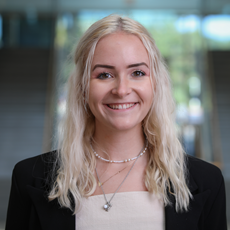 esj19@fsu.edu
esj19@fsu.edu
My research interests include trophic dynamics and community structures related to Elasmobranchs. I am particularly interested in the influence climate change has on complex food webs and how it may change over time. Previously, I have studied the diet of sandbar sharks (Carcharhinus plumbeus) off the Southeast coast of the United States which has driven my interests related to trophic ecology. I also have a broad background including paleoclimatology, marine mammal and sea turtle rehabilitation, and biogeochemical cycling.
Harris Krasner, MSc Student (Advisor Dr. Joel Trexler)
 hjk24b@fsu.edu
hjk24b@fsu.edu
My research aims to understand how top-down effects of invertebrate grazing pressure and bottom-up effects of nutrient enrichment impact vegetation communities in local freshwater springs. I am especially interested in the role of gastropod snails in controlling nuisance algae while quantifying if increased grazer density promotes the production of algal toxins and potential implications on the ecosystem.
Bentley Mercer, MSc student (Advisor Dr. Joel Trexler)
 bmercer@bio.fsu.edu
bmercer@bio.fsu.edu
(she/her) I am broadly interested in marine ecology. My research focuses on how submarine groundwater discharge affects benthic marine organisms. I hope my work helps inform decisions to mitigate anthropogenic stressors on marine ecosystems.
Annais Muschett-Bonilla, Ph.D. Candidate (Advisor Dr. Dean Grubbs)
 amuschettbonilla@bio.fsu.edu
amuschettbonilla@bio.fsu.edu
My research investigates reproductive strategies in elasmobranchs (sharks, skates, rays, and sawfish). My goal is to understand variation in maternal investment between closely and distantly related species, along with variation at an individual level. The physiological mechanisms that drive the mode of embryonic nourishment in these species are being investigated, along with studies attempting to highlight the biochemical content and nutrient composition of fluids used to nourish embryos in various species. Finally, after attempting to understand how and to what extent mothers nourish their embryos, my research aims to determine the effects of maternal investment on the mother and assess potential costs of large maternal investment in these species.
Signe Renstrom, MSc student (Advisor Dr. Joel Trexler)
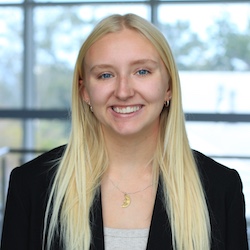 I have a broad interest in freshwater ecology, with a particular focus on how these systems are changing over time in response to anthropogenic impacts or shifts in hydrology. I hope to characterize both historical and contemporary food webs in a freshwater system and to identify the drivers of these changes.
I have a broad interest in freshwater ecology, with a particular focus on how these systems are changing over time in response to anthropogenic impacts or shifts in hydrology. I hope to characterize both historical and contemporary food webs in a freshwater system and to identify the drivers of these changes.
Simone Schuster, MSc student (Advisors Dr. Josh Breithaupt and Dr. Austin Mast)
 ses24d@fsu.edu
ses24d@fsu.edu
(she/they) I am interested in nutrient cycling in coastal environments, specifically coastal soils and mangroves. Growing up in Florida, I have a strong passion for the coast, and I am interested to gain more understanding of how our coastlines can help with the climate crisis.
Earth, Ocean, & Atmospheric Science
Adam Alfasso, Ph.D. Candidate (Advisor Dr. Sandra Brooke)
Geography
Jenny Bueno, Ph.D. Candidate (Advisors Dr. Sandra Brooke and Dr. Sarah Lester)
 jbueno@fsu.edu
jbueno@fsu.edu
Jenny’s research focuses on the application of remote sensing to answer biogeographic questions of intertidal coastal systems. Her first two years focused on mapping the intertidal oyster reefs of Apalachicola Bay using unoccupied aerial systems (UAS, also known as drones). She is now a Margaret A. Davidson fellow, working on understanding the expansion of mangrove trees in the Apalachicola Bay region. Specifically, she is examining the rate at which mangroves are encroaching and their geographic differences across the bay. Prior to pursuing her PhD, Jenny earned her B.Sc. in Earth and Environmental Science from the University of Illinois at Chicago. She also worked professionally at the Illinois State Geological Survey, using remote sensing techniques to detect coastal change in lacustrine environments.

